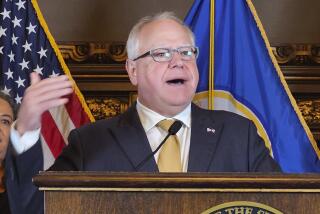Move Over, Alben Barkley
- Share via
When Bill Clinton was contemplating Al Gore as his 1992 running mate, he placed a call to former Tennessee Gov. Ned McWherter, and wondered aloud whether the fact that both he and Gore hailed from small, adjacent Southern states would prove an electoral disadvantage.
“Sure, it will be a disadvantage,” McWherter replied. “Why you might not do any better than Harry Truman and Alben Barkley.” The president from Missouri and the senator from Kentucky had defeated Republicans Tom Dewey and Earl Warren in 1948, the century’s biggest presidential upset.
Now some speculate that Gore will emulate Barkley in another way, becoming only the second post-World War II vice president to compete unsuccessfully for his party’s presidential nomination, dethroned in this case by Bill Bradley, the former NBA star and three-term New Jersey senator.
Just months ago, the question would have seemed ludicrous. On Feb. 3, Gore’s most formidable potential challenger, Rep. Richard A. Gephardt (D-Mo.), announced he would forgo the race, driven out by a veiled threat from Gore supporters that they would work to undermine his position as House Democratic leader should he challenge the vice president, and some plain talk from Big Labor that he could not bank on its undivided allegiance, despite their shared commitment to trade protectionism.
Less-threatening contenders also opted out, their decisions prompted by logic and arithmetic. As Clinton’s heir apparent, Gore had been collecting political IOUs for six years. He had most of his party’s best political organizers under yoke, and was--to understate things--a fund-raiser of proven skills, certain to raise the estimated $25 million needed to compete in the front-loaded delegate selection process ahead.
Now, Bradley is suddenly viewed as a serious contender who could well upset Gore in the Iowa caucuses and New Hampshire primary, building momentum for the “Super Tuesdays” that follow. An action-hungry political press notwithstanding, Gore has some real problems.
For one thing, he looks like a loser, trailing the Republican front-runner, Gov. George W. Bush of Texas, by double-digit numbers. And his negatives are high; nearly half of those sampled in one recent poll said they wouldn’t vote for Gore regardless of his opponent.
Gore acolytes dismiss this as a case of “vice presidential syndrome,” endemic to those working in the shadow of the Oval Office. True enough most of the time, but unconvincing from a crowd that has spent six years heralding Gore as “the greatest vice president in history,” with unprecedented policy influence. No, Gore’s standing in public opinion may well be based on judgments about Gore himself.
Second, the phenomenon of “Clinton fatigue” may finally be settling in, affecting Gore adversely. In a recent Pew Research Center poll, nearly two-thirds of Democrats and 77% of independents agreed with the statement, “I am tired of all the problems associated with the Clinton administration.” No doubt, the “Comeback Kid” would find a way to connect with voters again were his reelection at stake. But the awkward, sometimes-pouting Gore lacks Clinton’ deft political touch.
Third, Kosovo will almost certainly hurt Gore. Recall how little mileage President Bush got from his Persian Gulf victory once critics zeroed in on his failure to anticipate Saddam Hussein’s move or stop his smashing the Kurdish and Shiite uprisings. Against that political standard, how will this administration’s diplomacy at Rambouillet be judged, not to mention a battlefield strategy that has produced calamity for more than a million internal and external ethnic Albanian refugees?
Fourth, Bradley is a tougher challenger than many predicted. On the basis of early fund-raising returns, he seems likely to reach the $25 million figure in time to compete nationally. And the former Knick is well known in New York and California, megastates that will both hold March primaries. Gore surely must be lamenting having swept the field of other Democratic contenders who, if they were now running, would be dividing the anti-administration vote.
Still, if Gore can avoid trying to reinvent himself every time Bradley wins a primary, he should be able to hold off the challenger. He has enormous advantages among party regulars, government workers and union officials, who still deliver lots of votes in the critical primary and caucus states.
Bradley is, after all, the same laconic three-term senator who was never considered a leader despite some useful work on tax and campaign-spending reform. His defining votes were on the Gulf War resolution and welfare reform, and he voted against both. Trying now to inspire a fresh effort to improve race relations, his message seems something of a jock’s noblesse oblige: If white people would only look into their hearts, they could get along with blacks as well as he did with teammates like Willis Reed, Walt Frazier and Earl “The Pearl” Monroe.
What alarms many Democrats, then, is not that Bradley can upset Gore for the nomination but that he will so bruise Gore as to ensure his defeat by a Republican. To these Democrats, Gore, like Republican Bob Dole in the last election, has too many advantages to lose the nomination and too much baggage to win the presidency. It is not the second coming of Alben Barkley they see in their brother from Tennessee, but rather, a Democrat Dole.
More to Read
Get the L.A. Times Politics newsletter
Deeply reported insights into legislation, politics and policy from Sacramento, Washington and beyond. In your inbox twice per week.
You may occasionally receive promotional content from the Los Angeles Times.









